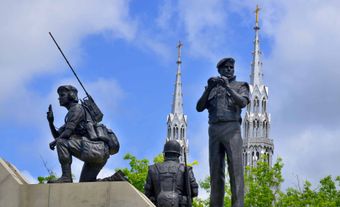This article was originally published in Maclean’s magazine on March 6, 1995. Partner content is not updated.
Open Skies Agreement Signed
The real winners from the opening of air routes between Canada and the United States are frequent flyers like Calgary-based lawyer Richard Dixon. Within the next few months, the Lang Michener partner will finally be able to jet directly from his home office to visit oil-and-gas industry clients in Houston on an Air Canada flight. Right now, that flight entails a time-consuming transfer in Dallas. Says Dixon: "Open skies is a godsend for me and other businesspeople. It will let us go straight from point A to B and save on time and aggravation."
The prospect of open skies also brings visions of soaring profits at Canada's two major airlines, a remarkable turnaround from the near ruinous combined losses of more than $2 billion in the past three years at Montreal-based Air Canada and PWA Corp. of Calgary, parent of Canadian Airlines International Ltd. During U.S. President Bill Clinton's visit to Ottawa last week, he and Prime Minister Jean Chrétien finally signed an agreement to deregulate air travel between the two countries. Under the old rules, Canadian carriers were blocked out of 40 per cent of the 77 U.S. cities. For example, no Air Canada or PWA jet was allowed to load or unload passengers in Detroit's and Philadelphia's airports. But with a stroke of the pen last week, Canadian airlines won the right to immediately fly into any U.S. city, while U.S. airlines will get access to Canadian airports over the next three years. Montreal-based airline analyst Jacques Kavafian of Lévesque Beaubien Geoffrion Inc. says: "Open skies is a very positive development for Canada's airlines. They just can't lose."
Even before the open skies deal was signed, however, Air Canada was taking flight. It reported profits of $129 million in 1994, up from a punishing $326-million loss the previous year. The airline also forecast profits of more than $100 million for 1995, with plans to add 20 new routes to the United States. Air Canada carried 400,000 more passengers last year than in 1993, while getting more flying time out of its planes through simple measures like increasing the amount of maintenance done at night. Air Canada chief operating officer Jean-Jacques Bourgeault noted, "One element of our success in 1994 was international expansion. We see that success continuing next year with expansion in the U.S. market."
The financial picture, however, remained slightly overcast at debt-burdened PWA, where the strength of the U.S. dollar, rising interest rates, a three-week strike at a regional carrier and the temporary grounding of 15 small planes for safety reasons last fall translated into a $38-million loss for 1994. Still, that was a marked improvement over the $292 million in red ink spilled in 1993. PWA forecasts a $52-million profit for 1995, a projection that is partly based on more flights to U.S. destinations. Said PWA senior vice-president of finance Drew Fitch: "There's opportunity for us in open skies, although we're taking a more gradual approach than Air Canada."
Executives from both airlines downplayed the potential threat that they face from U.S. carriers in Canada - despite the great disparity between the size of Canadian and U.S. airlines; AMR Corp.'s American Airlines of Fort Worth, Tex., has a fleet of more than 600 planes compared with PWA's 80 aircraft and Air Canada's 107. For one thing, many U.S. carriers are struggling with debt left by aggressive expansion in the 1980s, and, says Air Canada's Bourgeault, "the U.S. industry is not healthy. They show little interest in a price war over routes to Canada."
But some things will not change under open skies. Certainly, the new policies will only intensify the dogfights between Air Canada and PWA, continuing squabbles that erupted last year when the two carriers scrapped over the right to fly into Asia. Bickering is expected to erupt over 15 coveted landing slots at New York City's La Guardia airport and 10 slots at Chicago's O'Hare airport. The Canadian government will be awarding these spots in the next few weeks. Air Canada chief executive Hollis Harris has already declared that awarding PWA the New York slots "would be a travesty of justice." For his part, Transport Minister Doug Young suggested last week that both carriers should "take a Valium" until he makes his decision - based on "common sense" - about the routes.
Continent-wide deregulation fits the expanded North American connections of Canada's airlines. American Airlines holds 29 per cent of PWA, while Air Canada owns 20 per cent of Continental Airlines of Houston, and has marketing ties with United Airlines. PWA's Fitch says that under open skies, "We will be able to get more out of our relationship with American."
The close links to the United States also extend to the executive suite: Air Canada's Harris is a U.S. citizen who joined the company in 1992 after stints as president of Continental Airlines and Delta Airlines. Harris still owns a house in Atlanta and heads south every few weeks. Right now, he takes a Delta flight because Air Canada does not yet serve Atlanta. But under the new rules, Harris will be flying directly home on his own airline. That makes the Air Canada CEO a winner in the open skies.
Maclean's March 6, 1995

 Share on Facebook
Share on Facebook Share on X
Share on X Share by Email
Share by Email Share on Google Classroom
Share on Google Classroom


